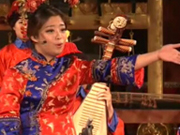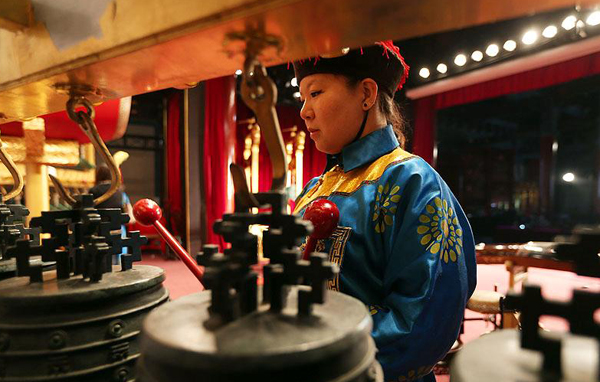Music from the Temple of Heaven

 0 Comment(s)
0 Comment(s) Print
Print E-mail CNTV, October 17, 2014
E-mail CNTV, October 17, 2014
The Divine Music Administration at the Temple of Heaven has a band called the Elegant Music Orchestra. A similar group served the emperor at the imperial courts and took part in the most important national ceremony of Chinese dynasties that happened in winter at 3 a.m.
 |
|
Band of Elegant Music Orchestra |
A piece titled Toast to the Emperor was played when officials proposed a toast to the emperor. Traditionally performed near the Gate of Supreme Harmony, the largest gate of the Forbidden City, the piece employs 11 musician playing gongs, flutes, pipes, drums and clappers.
"The Divine Music association was established in 1420, during the Ming Dynasty. It's an academy that trains officials and the orchestra in Chinese rituals," said Wang Ling, director of Divine Music Administration.
A piece called Eight Beautiful Views of Yanjing is based on an imperial military song from the Qing dynasty. It was played on horse back in the imperial parade. It has been given a gentler touch by being adapted into a female solo, which describes the eight beautiful views of Yanjing, or present day Beijing.
The Divine Music Administration was disbanded with the collapse of the Qing dynasty in 1912.
Today, the orchestra has 30 members and is committed to restoring and promoting the rituals and music of ancient China.
The administration is part of a long-standing tradition held by China long before the Ming and Qing dynasties. And this continuation of an ongoing heritage is also true to the Temple of Heaven.
Though much smaller than its Tang dynasty cousin, the Hall of Prayer for Good Harvest is no doubt a stunning structure. The emperor came to the structure every spring to pray and worship Huangtianshangdi, the supreme deity in traditional Chinese belief. Also known as 'Di' or 'Tian', it was believed that Huangtianshangdi governed the growth and harvest of crops, vital for an agricultural society. One unique feature of the structure is that there are no images or statues in the hall, only a tablet placed at the center of the structure to represent Di.
But the most important ceremonial event in China happened in winter at the Circular Mound Altar, where emperors gathered with massive groups of officials, ministers and performers and offered sacrifices to 'Tian'. The emperor was known as 'Tianzi' or the "Son of Heaven" and reigned supreme over China. During the ceremony, he prostrated himself in freezing temperatures before the tablet to offer sacrifices.
The ceremony and rites can be traced back to the Zhou dynasty, more than 3000 years ago. It is also found in many of the Chinese classics and inscriptions on bones and tortoise shell in ancient times. The sage Confucius was a major advocate of the rites of Zhou, and his works have had a profound influence. Virtually all of China's emperors practiced the ceremony during their rule.
The three-tiered Circular Mound also conveys this belief. With the tablet representing 'Tian' on the top tier and the lowest tier representing the people and the earth. The emperor positioned himself on the second tier at the beginning of the ceremony, standing as a mediator between 'Tian' and his subjects.
A piece called Back to the Palace was played after the ceremony was over and the emperor was being escorted home. Tradition says Tian not only governs the crops and harvest, but also pretty much everything else, including the welfare of the kingdom and the rule of the son of heaven. The music has a very bright and upbeat melody, and after a ceremony paying homage to Tian, the emperor can leave on a high note.
Though the music and the tradition at the Temple of Heaven seems distant to the average Chinese, it is being recovered and is likely to be a priceless treasure in shaping and enriching the understanding of modern Chinese concerning their native culture.






Go to Forum >>0 Comment(s)